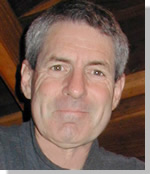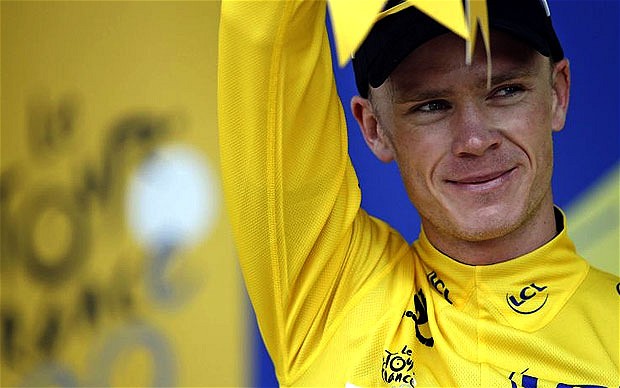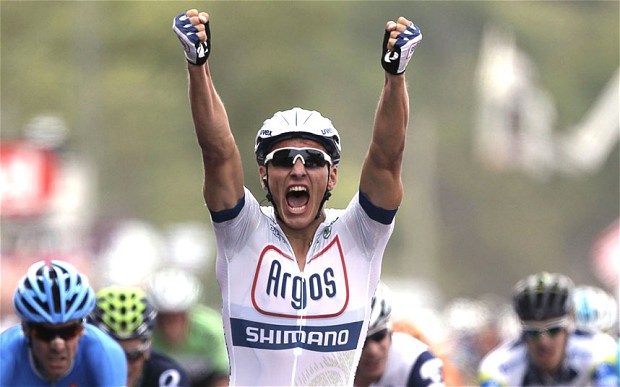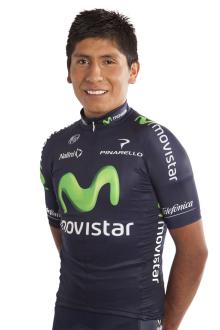 On The Road
On The Road
by: Bill Oetinger 8/1/2013
Tour de Froome
Well of course I'm going to want to talk about the recently completed Tour de France. It was a good race, perhaps even a great one. Chris Froome dominated proceedings and had things under control throughout. From his smack-down win on the first mountain stage (Stage 8 to Ax 3 Domaines), it was pretty much a done deal. There were a few cracks--small, hairline cracks--in his armor, and they allowed us to imagine, now and then, that the outcome might be in doubt. But no…not really. When it was all wrapped up in the gloaming on the Champs Élysées, it was easy to see he had matters well in hand throughout.
 Froome won that first mountaintop finish and he won the high-profile, Bastille Day finish atop Mont-Ventoux. He won the hilly time trial and finished a close second in the flat time trial behind Tony Martin, the best (flat) time trial rider in the world. Over the course of those four stages, he accumulated enough time over his rivals to be comfortable, so that in two other important mountaintop finishes, he could afford to concede a minute in one and a few seconds in another to the two riders who would end up second and third: Nairo Quintana and Joaquin Rodriguez. And even in those holding actions, he was still padding his margin over everyone else in the GC hunt.
Froome won that first mountaintop finish and he won the high-profile, Bastille Day finish atop Mont-Ventoux. He won the hilly time trial and finished a close second in the flat time trial behind Tony Martin, the best (flat) time trial rider in the world. Over the course of those four stages, he accumulated enough time over his rivals to be comfortable, so that in two other important mountaintop finishes, he could afford to concede a minute in one and a few seconds in another to the two riders who would end up second and third: Nairo Quintana and Joaquin Rodriguez. And even in those holding actions, he was still padding his margin over everyone else in the GC hunt.
But that domination by Froome and Sky did little to spoil the fun for all of us bike race fans. We may not have been on the edges of our chairs every moment of every day, but we still had plenty of drama and tension to keep us happy. If you care enough about the race to be reading this column, you already know all the details…who won what and by how much. So no point in rehashing those details. Instead, I'll make a few general observations, colored with the benefit of 20-20 hindsight.
• Predictions
I've written two columns about racing so far this year: one about the spring season (March and April) and one about the big events in May (the Giro d'Italia and the Tour of California). In the first piece, I noted that the riders who seemed to be showing the best form in the spring were Vincenzo Nibali, Daniel Martin, Chris Froome, Nairo Quintana, and Joaquin Rodriguez. I declined to call that a prediction about future performance…just an observation about early season results. I hate making predictions, because if you get them wrong, you look like such a dope. But in this case, I should have put my money on these guys. Nibali won the Giro, and Froome, Quintana, and Rodriguez made up the Tour podium. Only Martin failed to come through for me, but he did at least win a stage at the Tour.
In my other column, I stated the winner of the California Tour--Tejay van Garderen--would now "be up in the ranks of people to be reckoned with in any race he enters." I'm not sure you can call that a prediction, but it certainly fizzled out as a working premise at the TdF. He lost buckets of time early and often and was pretty much out of it from the start. He came close to redeeming his tour with an oh-so-close second on the queen stage to Alpe d'Huez, but even that ended in disappointment. (If Tejay couldn't win that spectacular stage, I'm happy to see Frenchman Christophe Riblon do so. The French have had so little to cheer about in recent Tours. This was a sweet win for the homies.)
• Sprinters
 I'm not sure this was a prediction either, but in the May wrap-up, I said: "It's going to be interesting to see how he (Mark Cavendish) and Peter Sagan sort out the sprints at the Tour." Cavendish had won five sprints at the Giro and Sagan had won two in California. Well…not so fast! Sagan did in fact win the green points jersey of best sprinter, but he was not the fastest sprinter in the Tour.
I'm not sure this was a prediction either, but in the May wrap-up, I said: "It's going to be interesting to see how he (Mark Cavendish) and Peter Sagan sort out the sprints at the Tour." Cavendish had won five sprints at the Giro and Sagan had won two in California. Well…not so fast! Sagan did in fact win the green points jersey of best sprinter, but he was not the fastest sprinter in the Tour.
He only won one sprint, while Marcel Kittel won four and Mark Cavendish won two. André Greipel and Simon Gerrans each beat Sagan in sprints as well. But Sagan was the most consistent, with one first, four seconds, two thirds, and at least a couple of fourths. The other sprinters, when not winning, were usually not anywhere near the front. It was all or nothing for them. (Cav had one second and two thirds, Kittel had only one third, and Greipel had two seconds.) So in Sagan's case, this year, it was better to be a bridesmaid--many times--than to be a bride.
• Winners
In October of 2011, I reviewed the Vuelta of that year, under the heading New Kids on the Block. The principal new kids in question were Juan Jose Cobo and Chris Froome, with Cobo beating Froome in the stage race by a scant 13 seconds. (And as I pointed out later, without bonus seconds awarded for first, second, and third factored in, Froome would have won that Vuelta.) Both riders came out of nowhere to star in that very exciting race. Both were relative unknowns riding in support of their team captains. Since then, Cobo has done pretty much nothing at all. Froome, on the other hand, has become the poster boy of a new generation of bike racers. (Is there anyone at this point who thinks Froome could not have won last year's Tour had he not been riding in support of team leader Wiggins?)
I like Chris Froome. He's easy to like. I confess I never could warm up to his predecessor at Sky, Bradley Wiggins. Not quite sure why, but he just never engaged with the public very well. But Froome seems very approachable and affable and courteous. Not to mention a kick-ass bike rider. I was interested to read a churlish, puling rant from French racer John Gadret midway through the Tour, about how all the other racers hate Froome because he has the backing of such a big powerful team…some sort of unfair advantage, he seemed to imply. I found this a curious point of view. I'm no big fan of Sky Procycling, for the silly reason that their ultimate paymaster is the vile Rupert Murdoch. But the team has been built up and fine-tuned with hard work and savvy more than with money. I don't see any unfair advantage at work there. And in this Tour they lost two strong workhorses early on: Edvald Boasson Hagen and Vasil Kiryienka. So they were working with a short staff.
Most of the time, they still had enough weapons to make the other teams hurt, with Mick Rogers and the amazing Richie Porte driving at the front of the group, high into the hills, whittling the pack down to only a few riders. (Porte is another rider to watch in the future.) But there were a few days when, for a variety of reasons, Froome ran out of lieutenants and had to keep control of things all on his lonesome. And he did so. He looked like he was near his limit once or twice, but overall, he was more on top of the situation, day in and day out, than anyone else.
 Nairo Quintana was, for most people, the big new sensation of the Tour. (But not for me…recall my quasi-prediction about his good form in the spring.) I had noted that not only can he climb with the best, he can also time-trial pretty well. In fact, his Tour TTs were only respectable. He lost 3:16 to Froome in the flatter one and 1:11 in the hillier one. That adds up to 4:27. He finished second to Froome in the Tour by 4:20. That doesn't mean he would have beaten Froome if he could have matched him in the ITTs. If they had been closer in the last stages--Alpe d'Huez and Annecy-Semnoz--you have to believe Froome would not have allowed Quintana to ride away and take as much time back as he did, not after the way Froome dropped Quintana on Ventoux. Still, this young Columbian has a bright future. He has turned in some good time trials in his short career so far, and if he can improve in that discipline…watch out.
Nairo Quintana was, for most people, the big new sensation of the Tour. (But not for me…recall my quasi-prediction about his good form in the spring.) I had noted that not only can he climb with the best, he can also time-trial pretty well. In fact, his Tour TTs were only respectable. He lost 3:16 to Froome in the flatter one and 1:11 in the hillier one. That adds up to 4:27. He finished second to Froome in the Tour by 4:20. That doesn't mean he would have beaten Froome if he could have matched him in the ITTs. If they had been closer in the last stages--Alpe d'Huez and Annecy-Semnoz--you have to believe Froome would not have allowed Quintana to ride away and take as much time back as he did, not after the way Froome dropped Quintana on Ventoux. Still, this young Columbian has a bright future. He has turned in some good time trials in his short career so far, and if he can improve in that discipline…watch out.
It must have been sweet revenge for Joaquin Rodriguez to bump Alberto Contador off the podium on the last mountain stage. Remember that last year, at the Vuelta, Contador had snatched the overall victory away from Rodriguez on the last mountain stage in a most improbable coup. Rodriguez rode better as the Tour wore on. He said he was aiming for the podium, but few thought it was possible, with all the big names ahead of him. But he kept plugging away at it with big efforts in the mountains of the last week, and with a very good time trial, not usually his strong suit. He has now been on the podium of all three grand tours: second in last year's Giro and third in last year's Vuelta, and now third in the Tour. I expect more good things from him.
Speaking of coming on strong in the last week of the Tour: Chapeau! to Andrew Talansky. He dug himself into a hole early in the Tour, but he too kept plugging away and looking better every day. He and his team made a bit of luck for themselves when he got into a successful breakaway on Stage 14, and when it was over, he had picked up seven minutes in the GC standings, clawing himself back to near the top of the field. Finally, with a valiant effort on the last mountain stage--a 6th-place finish--he leapfrogged two riders to end up in the top ten in his first Tour de France. Another new kid on the block.
• Losers
Only one person wins a stage race, so there are approximately 200 "losers," by some manner of calculation. But in this sense, I'm thinking only of the handful of riders who had been tagged as possible winners ahead of time but failed to deliver the goods.
Alberto Contador finished 4th, which would have been a triumph for almost anyone else, but which is well below his best. He never, not once, was on an even footing with Froome, nor really with Quintana or Rodriguez. It does make me wonder how much of his past glory was the result of "tainted beef."
Alejandro Valverde rode a lively, animated tour to finish 8th. He might have done better but for that strange Stage 13, where he stopped to swap out a wheel and missed out on the decisive move of the day. (I remember watching that wheel change and thinking: they are being way too casual about it…get moving!) In the end, those few seconds of dilly-dallying with the team car caused them to miss the important break, and by the time all the cross-wind echelons had formed and his little group had missed the bus, the time lost to the yellow jersey group was 8:45. All else being equal, at the end of the Tour, he would have been in 6th place instead of 8th.
Jurgen Van Den Broeck crashed out of the Tour so early, we never got to see if he had what it would take to repeat his good form from past races. Ryder Hesjedal simply disappeared, as he had at the Giro. Andy Schleck finished a quiet 20th.
One of the biggest flops among the presumptive contenders was Cadel Evans, just two years removed from his own maillot jaune and just two months removed from a third at the Giro. On every mountaintop finish, he was one of the first notables to lose the lead group. He lost minutes in bunches on every important stage, often finishing in the grupetto with the sprinters. He also tanked in the two time trials, finishing 10th from last in the mountain TT. In the end, he was 39th, over an hour and a half off the lead. In an interview after that time trial, he said he started the Tour exhausted and only became more so as the days went by, and that all he was trying to do was survive to Paris. This may be another proof of the premise that it is no longer possible to be competitive at both the Giro and the Tour. Or it may simply mean that his time has passed.
But as bad as Evans' Tour was, numerically at least he did better than his younger teammate Tejay van Garderen, who was another eight minutes behind Evans and a long, long way from his 5th place and Best Young Rider jersey of last year. Or, for that matter, from his triumph at the recent Tour of California. I read a couple of interviews with him, but I never got a definitive answer as to why he did so poorly. That's a mystery that will follow him around until he does something to redirect his once rising star.
• What's next?
What's next is, first of all, the 7-stage Tour of Poland, going on as this column hits the cyber-street. Some interesting folks lined up for it: VInnie Nibali, Bradley Wiggins, Rigoberto Uran, Ivan Basso… (Ivan Basso? Hasn't he retired yet?)
But the big one looming on the very hilly horizon is the Vuelta a España (August 24-September 15), which has come to be my favorite grand tour of the year. This year looks like more of the same crazy parcourse the event has been featuring of late. Of the 21 stages, no less than 12 are designated as mountain stages, with eight or nine of them offering true uphill finishes. Another three have uphill finishes as well, but they're just short little walls (which can make for highly entertaining finishes, even if they don't produce big time gaps). The hilly stages begin on Stage 2 and are scattered throughout the three weeks, ending with Stage 20 before the ceremonial roll around Madrid on the final day. That last one finishes with the dreaded Angliru, often referred to as the most feared climb in Europe. It last appeared in the Vuelta in that thrilling 2011 edition, where Cobo and Froome introduced themselves to the cycling world. There is only one time trial, and it has a Cat 3 climb in the middle.
Clearly, it's a tour built for the climbers. It's a little early to see full team rosters for this event, but I'm pretty sure Contador will not be there. I'm guessing Rodriguez will be, and it's a course tailor-made for his strengths. Whoever the chief protagonists are, they are going to be in for a ring-tailed snorter of a stage race…and we will get to go along for the ride.
But until these new divertimenti pop up on our streaming video, let's savor the wonderful Tour we've just been privileged to enjoy. Let's tip our hats to Chris Froome, Richie Porte, and their Sky-high gang; to Nairo Quintana and Joaquin Rodriguez and all the rest of the road warriors (winners or losers). Thanks for another delightful reminder of why we like this sport so much.
Bill can be reached at srccride@sonic.net

